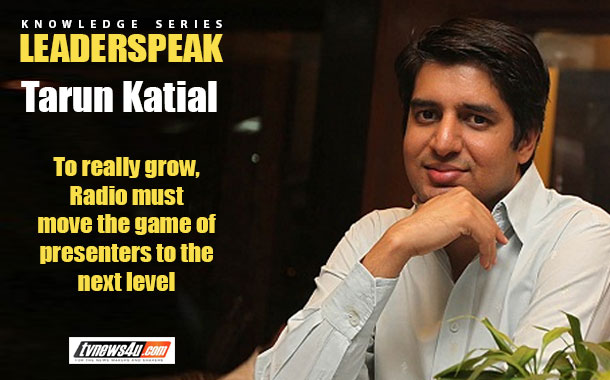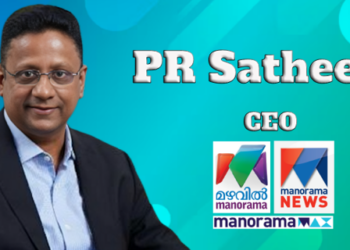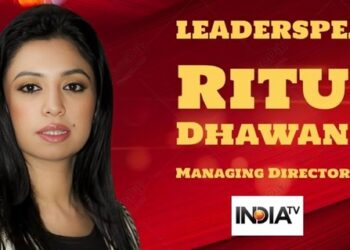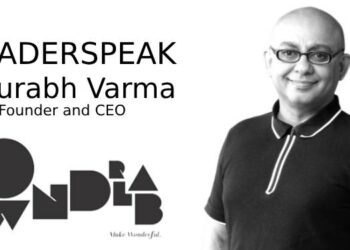Tarun Katial is one of the youngest and most respected thought leaders in media and entertainment in India, and puts a formidable mix of knowledge and learnings from his enormous experience and success, plus a strong-minded creative hands-on approach to all critical aspects like the content and value creation and delivery chains for all constituents of Reliance Broadcast Network Limited, which he has spearheaded as CEO for long now.
In this, the first of two parts of a long and rewarding chat for our Leaderspeak series, Katial speaks to TVNEWS4U.COM about the Radio industry and the nurturing of great creative and other talent that continuously refreshes and energises not only the BIG FM network, but, indeed, the entire industry with its output and success.
Excerpts from the conversation.
The one-line descriptor for what you do is sell content that is sticky. Across various platforms. What is it that makes you different from the others in terms of the quality that you give out?
TK: One of the things that you know any business can do justice with or can do well for themselves with, is an extreme commitment to the consumer. Over the years I’ve realized that you can be as good as or better than your competition, you can be as good as you think your idea is, you can be as innovative as they get in the marketplace, but the one thing that can make you successful is your commitment to your consumer or your customer.
So my entire approach, personal approach to work and business, begins with the question, ‘Do I know my consumer enough?’ and ‘Can I challenge myself?’ To be able to give him more than he deserves and better than he deserves. And that’s really my single-line effort. It is not more than my competition or more than what I’ve given before. It is more than you know what we all believe the consumer deserves to get. And the consumer is a deserving consumer, he wants the best, so if you can literally go out and give him better than what he expected, and if you can excite him beyond what he thinks is good enough, you’ve got your game going.
So how do you push the envelope with such a mass thing as retro music, where your consumer is not segmented, and it has an appeal across age groups, perhaps more in the higher-purchasing power consumers, but even the youngsters groove most to songs that are essentially remixes of the west evergreens.
TK: So I think that we did was is that we understood that retro music was timeless and it had an appeal through age groups and through gender, but how do we present it differently than what has been presented before? And we hit upon the idea of personality radio, so we essentially don’t do retro, we do personality radio. Each of our shows is driven by a personality; it’s driven by people who can connect with the consumer, entertain the consumer and give the consumer more than what he thought was possible in retro music.
They are essentially great story tellers. And when you speak about stickiness, what makes you, what makes a product sticky is about how well you can tell a story, how well you can keep people enthralled, interested, engaged. So they are relatable icons, who can tell you a story really well. Like there’s a personality like Annu Kapur who is extremely relatable, credible, who has the passion for what he’s doing, and can engage you in great story telling, so his ability to tell a story makes him the personality he is.
And Nasha has emulated this. They have a Satish Kaushik playing both himself and his calendar avatar, working very hard to be uber coolly conversational, and I think they’re doing this to primarily include the younger listeners into their cool retro offerings of 70s, 80s and 90s music, who otherwise would naturally be more inclined to the latest numbers. Now, for their second frequencies under Phase III, or through network acquisitions, FM Radio networks which had parked themselves in the latest-music space, are eyeing or have rolled out retro music stations. So your retro-only space is again getting crowded. So the space is going to become crowded. How do you view this, and how to you plan to remain ahead of the curve?
TK: Any competition actually makes a segment grow. It brings more attention to a segment, it brings more audiences to a segment and we believe it also adds to a deeper attempt to differentiate and learn more. So I think a challenge will be upon us to differentiate better and work harder to stand our ground.
Yes, and Radio, once you build your bands with credible personalities and great storytelling-driven content, lends itself better to appointment listening. So how are you going to keep yourself ahead of the rest of the pack?
TK: We’ve got some deep connects with the personalities. We’ve got to work harder on our content, we’ve got to work harder on the key things that consumers enjoy about retro, about great stories, about great research, and we have to do it better than most.
Your story-telling driven content has great shelf life. How are you planning to maximize it?
TK: We e have a plan to go on the digital space, and not just digital but multi-platform with the various content. We will look at mobile as a platform, we will look at app as a platform, we look at web as a platform, and we’re developing something in another area too… Some of that will come about in the next quarter or so.
You’re really serious about storytelling on BIG FM. Nayak is a good, pride-instilling narrative of inspirational Indian stalwarts, but at 9 pm? When I, particularly, looked forward to Anu Kapoor… well, this is a startlingly different offering that tells one you are never afraid to experiment. But then you also have Arth, which is again very conversational and forces you to reflect deeply about life and extential issues at a time when you’re driving back from work and probably just want to relax and listen to conversation of a different kind that’s purely entertaining, more elevator than TED EX…
TK: Nayak is doing very well. And we’re giving Arth a new twist. We’re also exploring a couple of new storytellers. It will launch very shortly. We’re getting a good storyteller… you will hear a good storyteller on the station.
Coming to Online or Internet Radio. Radio City has done some good work there…
TK: Online is a great place to be in. I think India should fundamentally clarify music rights for it to take off in volumes. Some of our competition has done some good work in online radio… like Radio Citi and Radio Mirchi… but unfortunately it’s not seen the volumes of listeners primarily because music licenses aren’t being sorted.
Yes. But if you look at the disposable time that people have, it is mostly during commutes and when they’re in their cars, and during that time, FM Radio stations are already preset and engaging with them. On another important aspect: Do you see enough traction for online radio from brands and advertisers?
TK: I think Brands and advertisers can change audiences, and the audiences chase great music. So eventually when music licenses get sorted, it will work.
The other problem with online radio in India is that, radio on the go — which is what online radio is all about is also available on the mobile, as the mobile itself is a radio receiver so that is the big advantage of FM radio in India doesn’t exist in the US. In the US, the mobile handsets are still not able to work as FM Radio receivers, while in India, most handsets come embedded with an FM radio receiver.
OK, on talent. How do you find, retain and grow and keep excited talent?
TK: Balance is the key, right. You need to be able to connect with them at a conceptual level, you need to be able to excite them at a conceptual level. It’s not about us versus them; it’s about our ability to co-create and curate great ideas. If somebody believes you can help them grow their ideas, they will want to be with you. Everybody wants to give birth to great ideas. They are always looking for that opportunity that platform to be able to partner with somebody, to be able to bring in ideas. That is exactly what we did with many of our talented people who had a great idea and I think we gave them the opportunity to bring it alive. You can’t impose ideas on talent, you can’t deal with creative talent as sales employees – a sales employee also actually doesn’t want to be treated like that, but you can’t create finite tight boundaries on talent and expect them to be able to flower.
If someone between say 24 and 35 comes to you and says ‘I want to join you’.. From skills… values… talents… what primarily do you look for?
TK: We look for attitude.
We look for competency. We look for your ability to be able to work with people, to be able to partner, to be able to think laterally, your ability to solve problems, to analyze before making decisions, to be able to adapt in difficult situations.
And how long do you take to make all those evaluations?
TK: We don’t take very long. We have a competency test that we make you go through. So we choose psychometrics to be able to judge.
So you can tell this is a well grounded and ready to take off kind of person. After that what do you look at? Education…?
TK: First we do the competency and then we could take you on, knowing fully well that there are some gaps, but we will work with psychometric testing and from the very beginning start putting you into training or on a programme so that you are able to overcome those gaps in your profile. It has really helped us, working with the psychometry. We’ve been doing it for the last two years.
How has that impacted the employee attrition rate at BIG?
TK: Our attrition is down by half in the last two years because you hire right, you retain.
I think our structure allows us to be able to do what we think is necessary to do far better than many organizations. We have complete empowerment in building the brand, building the content and doing what is right for the company. And it’s a very entrepreneurial culture which allows you to operate….in a very healthy space.
What should FM Radio do to be able to grow Time Spent Listening as a medium from around 3 and a half hours a week?
TK: The TSL on BIG is around 6 hours a week. But I think what can bring radio to the next level is a conscious effort by the industry overall. To move the game of presenters to the next level.
How do you do that?
TK: I think our industry has the opportunity to do what the best for radio. To present radio in a more credible manner. Unfortunately, when we started off with Radio, we saw it as a very base level medium and our we don’t invest enough time, effort, money in training our presenters to be voices of reason. When you hear that ‘this presenter is the best’, they have a huge amount of credibility that they carry. There’s a maturity, and that builds … I won’t use the word ‘seriousness’, but it gives the medium leverage and importance. Unfortunately while we’ve tried it, we can’t do it alone; the industry has to realize that they need to do it too…
Many stations have presenters in the ‘over-excited town crier’ mode…
TK: That honestly does not give the medium a good name. The medium of FM Radio will get respect when we give all presenters the amount of credibility that they require, the amount of gravitas that they require. And that doesn’t mean they have to do retro, CHS or they have to do AC. It just means that whoever is on the other side of the mic has a certain amount of deep thought before he or she speaks… you know.. in whichever tone his or her personality needs, but speaks warmly and has some restraint also. Have some respect for yourself and for your consumer.
So FM Radio Phase III. Plans?
TK: We’ve got a lot of new stations coming up, Pune, Lucknow, Varanasi, Patna, Nagpur.
Where is the talent? Are you making those little paratrooper teams, gearing up one good middle-level leader from a station to go select, create a talent pool in double quick time?
TK: Ah… we will get it…talent is available, India is a country of billions. We have good people. We just need to give them opportunities, recognize that they have the ability. We have run the biggest FM Radio network in the country for years now, and we are able and poised to scale up whenever required.
Next week: Part 2
















